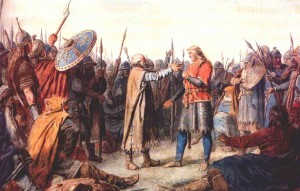Was Tostig a hero- or a villain?
 Listener Pete asks if Tostig Godwinson should be considered a heroic figure. It’s somewhat hard to get a fair picture of Tostig because unlike the other principle figures of 1066, he lacks a chronicle written from his perspective. He ended up on the wrong side in every respect- to the English he was a traitor, to the Normans he was irrelevant, and to the Norse he was merely a means to an end- a despicable figure who had sold out his own brother. But Tostig was clearly a man of many abilities- a fact which is frequently ignored. As the third son of Earl Godwin, he was always a bit overshadowed by his older brother Harold, but he obviously had the family knack for politics. His father secured him an influential marriage with the daughter of the Count of Flanders, and he quickly ingratiated himself at the English court. Thanks to his considerable charm he became the favorite brother of Queen Edith and so impressed King Edward that he was appointed Earl of Northumbria at the relatively young age of 30. This was a difficult assignment for many reasons. Northumbria was a mess, a wild place controlled by outlaws where the earl’s authority seldom went further than the outer wall of his household. The population was a mix of Danish and English who actively resisted outside control and did their best to continue the chaos.
Listener Pete asks if Tostig Godwinson should be considered a heroic figure. It’s somewhat hard to get a fair picture of Tostig because unlike the other principle figures of 1066, he lacks a chronicle written from his perspective. He ended up on the wrong side in every respect- to the English he was a traitor, to the Normans he was irrelevant, and to the Norse he was merely a means to an end- a despicable figure who had sold out his own brother. But Tostig was clearly a man of many abilities- a fact which is frequently ignored. As the third son of Earl Godwin, he was always a bit overshadowed by his older brother Harold, but he obviously had the family knack for politics. His father secured him an influential marriage with the daughter of the Count of Flanders, and he quickly ingratiated himself at the English court. Thanks to his considerable charm he became the favorite brother of Queen Edith and so impressed King Edward that he was appointed Earl of Northumbria at the relatively young age of 30. This was a difficult assignment for many reasons. Northumbria was a mess, a wild place controlled by outlaws where the earl’s authority seldom went further than the outer wall of his household. The population was a mix of Danish and English who actively resisted outside control and did their best to continue the chaos.
Tostig- who was half Danish himself- attacked the problem vigorously and within five years had cleaned up the earldom, arresting the cutthroats and firmly imposing his control. But just as he appeared ready to eclipse his brother everything started to go wrong. His mixed blood should have endeared him to his subjects, but as a southerner he was deeply resented and his habit of using Danish mercenaries as personal guards further alienated him. His firm rule, at first so necessary to enforce order only got harsher as his hired thugs extorted ever-higher taxes. Even worse, he began to show signs of irrational behavior. Any questioning of his authority met with excessive brutality. Two of his most important thegns that he suspected of insubordination were lured to a meeting and executed, and a third was assassinated. This was a wild violation of English law- one of an earl’s responsibilities was to protect his thegns not murder them. The resulting uproar led to Tostig’s banishment, a fate from which even the king couldn’t save him.
Tostig could have faced his exile stoically. He had family in Flanders and could have lived out his life in wealth and comfort. Instead he publicly accused Harold of fomenting the rebellion in his earldom, and left swearing revenge. The result was the death of his allies, himself, and eventually the overthrow of the English kingdom along with what was left of his family. However talented he was to start, Tostig ended as a rather tragic and pathetic figure, wandering around northern Europe begging for help, turned down by everyone he met except the bored Hardrada.
There was at least some redemption for his family. His son Skuli Tostisson Kongsfostre fled to Norway, and his offspring insinuated themselves into the Danish royal family. The current monarch Margrethe II is therefore a distant descendant of Tostig Godwinson.